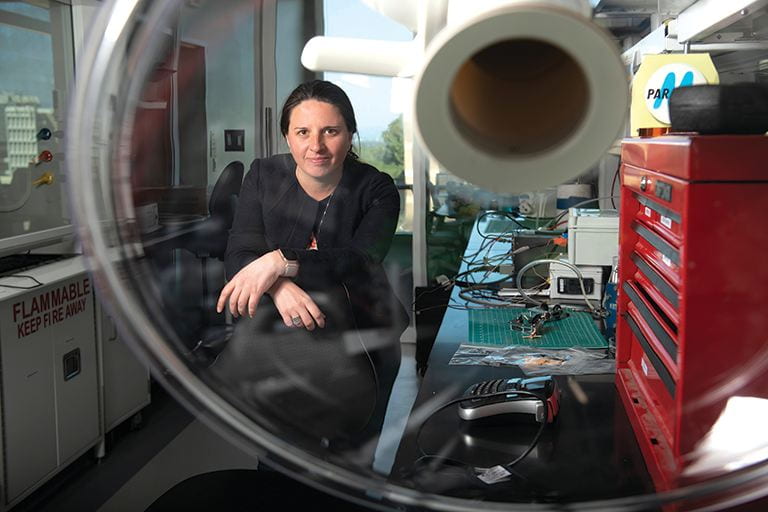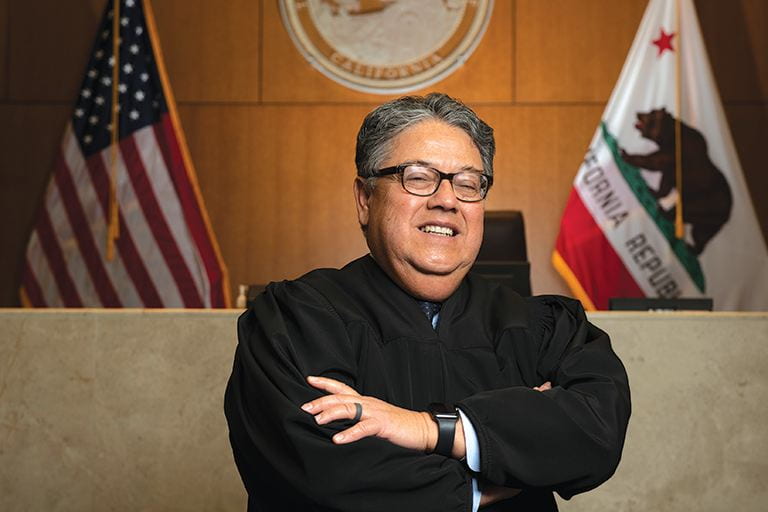Helping at-risk scholars
Reflections from Iryna Zenyuk, associate professor of chemical and biomolecular engineering
Feb. 24, 2022, was a regular day in the lab for me, with a proposal review panel and meetings – nothing extraordinary. I direct a large group and have a leadership role with the UCI National Fuel Cell Research Center, so every hour of the day is accounted for. But this “regular” day forever changed my life – along with the lives of millions of people around the world – as Russia invaded Ukraine, shelling its major cities Kyiv and Kharkiv.
Immediately after seeing the shocking news on TV, I messaged my cousin in Kharkiv to try to understand what was happening on the ground there. It was 4 a.m. in Ukraine, and her family was gathering belongings to relocate to a safer place. Disoriented and unprepared, they had not seen the war coming, just like many of us here in the U.S. My cousin spent the next four weeks hiding in a basement while being shelled every day. Her husband was in Russian-occupied territory with his parents for that period, and their daughter managed to escape to Poland 10 days later. They still haven’t seen each other. This is a typical situation for many families who have managed to survive the Russian war on Ukraine.
During the first week, I went to bed and woke up reading and watching news in disbelief: seeing cities being destroyed, civilians killed, children displaced, people finding shelter in basements and train stations. It all felt surreal. I had visited Ukraine in August 2021 in advance of the festivities marking its 30 years of independence. It was a glorious time watching the capital, Kyiv, preparing for the celebration; seeing the churches and other 1,000-year-old historical places all renovated; hearing the Ukrainian language everywhere; and just enjoying the good weather and relaxing during a peaceful time.
Being together with family and friends in western Ukraine reassured me that times were good in the country and that people were hopeful for a bright future. At the time, there was a controversy over a military parade that the president had planned to celebrate Independence Day, as we Ukrainians do not consider ourselves a militaristic nation, and having a parade to showcase all our military equipment seemed out of place. In August, few anticipated that the war in Luhansk and the Donbas initiated by separatists and backed by Russia years earlier would spread to other parts of Ukraine.
“As the days passed by, I felt the
need to do something to help fellow
Ukrainians, and an idea came to
mind to host academics here at UCI.”
– Iryna Zenyuk
I am Ukrainian American. I immigrated here at the age of 15 and became a U.S. citizen shortly thereafter. I completed all my higher education in the U.S. Until my early 20s, I lived in a Ukrainian diaspora community in New York City, participating in activities such as annual festivals and church retreats. My mother and brother still live there, and I get to visit them several times a year. I haven’t lost touch with my Ukrainian roots: I speak the language fluently and try to participate in Ukrainian activities whenever possible.
This war, like no other, has managed to unite Ukrainians all over the world. In the last several weeks, I have met more Ukrainians at UCI than during the entire three years I’ve been here as a professor.
As the days passed by, I felt the need to do something to help fellow Ukrainians, and an idea came to mind to host academics here at UCI. Little did I know that the university is a leader in this area and has a history of such humanitarian work.
I was introduced to Jane Newman, a UCI professor of comparative literature who founded the campus Scholars at Risk program back in 2017. Since then, the UCI schools of education, humanities, law, social sciences and pharmaceutical sciences have hosted a Turkish scholar and are currently hosting two Cameroonian scholars and three Afghan scholars, with a fourth scheduled to arrive in June. Along with the scholars are some 13 dependents (partners/spouses, children and, in one case, a younger sister) who were also offered sanctuary.
Scholars at Risk is an international program that, according to its website, “protects scholars suffering grave threats to their lives, liberty and well-being by arranging temporary research and teaching positions at institutions in our network as well as by providing advisory and referral services.” The program helps more than 800 scholars and scientists worldwide per year.
Since Professor Newman was still busy getting the Afghan scholars settled at UCI, we decided that I would lead the Ukrainian effort under her mentorship – launching a fundraising campaign, soliciting applications once the funds are raised and, lastly, helping the displaced scholars once they arrive.
The fundraising involved a direct ask of UCI leadership as well as setting up a crowdsourcing campaign. And so far, with the assistance of the provost, the vice chancellor for research, nine deans and campaign contributors, we have gathered more than $200,000 and are ready to host two scholars! UCI’s Claire Trevor School of the Arts also held a successful fundraising concert (#StandWithUkraine), organized by Ukrainian American pianist and UCI instructor Yuliya Minina. Since the very beginning of the effort, a dedicated campus cohort has greatly helped promote the crowdsourcing website and UCI’s Ukrainian scholar initiative: Vladimir Minin, professor of statistics; Kevin Bossenmeyer of the KUCI radio station; Dan Cooper, professor of pediatrics; student volunteer Jose Alberto Jr. Castaneda Montejo; and Maria Tkachuk from Beall Applied Innovation. This core group has met with me and Professor Newman to coordinate activities on a regular basis. I am fortunate to work with such a terrific team and grateful for all their contributions.
UCI has been extremely supportive of the Ukrainian cause. People have shown tremendous generosity. We are ready to move to the next stage: selecting the academics and bringing them to campus. (We already have several applicants.)
For years, I have known UCI for its excellence in education and research. But this experience has taught me that UCI is more than that: It’s a wonderful community, and it’s a family.
Zenyuk is an associate professor of chemical and biomolecular engineering. She is also associate director of the UCI-based National Fuel Cell Research Center.



